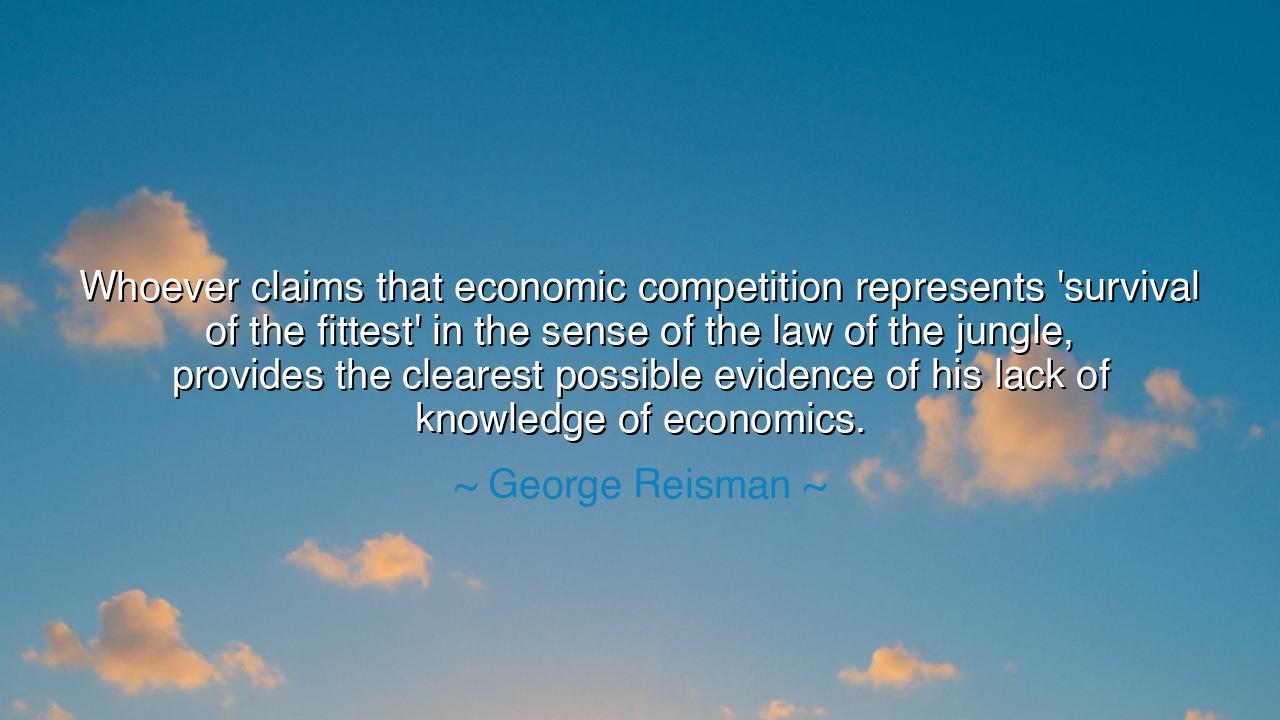
Whoever claims that economic competition represents 'survival of
Whoever claims that economic competition represents 'survival of the fittest' in the sense of the law of the jungle, provides the clearest possible evidence of his lack of knowledge of economics.






The words of George Reisman ring with the thunder of reason and the fire of justice: “Whoever claims that economic competition represents ‘survival of the fittest’ in the sense of the law of the jungle, provides the clearest possible evidence of his lack of knowledge of economics.” These are not the musings of a cold theorist, but the cry of a man defending the dignity of human creation. Reisman tears away the false mask that has too long shrouded the truth—that the marketplace is not a battlefield of beasts, but a forum of builders. The law of the jungle devours; the law of economics, rightly understood, uplifts.
In the jungle, the strong prey upon the weak. Power alone rules, and death is the measure of success. But in a free economy, true competition is not destruction—it is creation. The fittest are not those who crush their rivals, but those who serve humanity best. The merchant who sells bread at a fair price, the inventor who brings light into darkness, the farmer who multiplies the bounty of the earth—these are the victors of economic life. Their strength lies not in claws or cunning, but in knowledge, innovation, and service. Thus, to confuse the market with the wilderness is to misunderstand both man and his destiny.
Reisman’s words stand as a torch against the darkness of cynicism that too often engulfs society. There are those who look upon industry and commerce and see only greed, competition, and conflict. They say, “Behold, this is the jungle reborn!” But they see only the shadow, not the light behind it. For every great fortune built by deceit, there are ten built by labor, skill, and vision—by the striving of those who gave more than they took. The heart of a true economy beats not for conquest, but for cooperation; not for domination, but for exchange.
Consider the story of Andrew Carnegie, the steel magnate of the nineteenth century. As a young immigrant, he began with nothing, yet through innovation and discipline he transformed steelmaking and lowered its cost so that even the poor could afford what once only the rich possessed. And in the evening of his life, he gave his wealth to build libraries and schools, declaring, “He who dies rich dies disgraced.” Carnegie’s story is not one of jungle law but of human triumph—a man using his knowledge and capacity not to destroy, but to enrich the lives of millions. Reisman’s words find their living echo here: true economic strength is measured by creation, not consumption; by giving, not taking.
The ignorance of economics that Reisman condemns is not mere academic error—it is moral blindness. It fails to see that the free exchange of goods, services, and ideas binds people together in mutual benefit. The baker depends on the farmer; the builder depends on the miner; the scientist depends on the teacher. This vast network of exchange, born from countless acts of trust, is civilization itself. It is the opposite of the jungle, for in the jungle there is isolation, but in the market, there is interdependence. The coin that passes from hand to hand carries not the mark of predation, but of peace.
Let us, then, take heed of this truth. When we speak of competition, let us not think of cruelty but of courage; not of oppression but of excellence. For the truest competition is not against our neighbor, but against our own lesser selves—against laziness, ignorance, and fear. The market, when ruled by virtue and guided by reason, becomes a mirror of man’s highest potential. It calls each to rise, to innovate, to create something of worth. In that striving, all may prosper.
O listener, remember this teaching: the law of the jungle ends in ashes, but the law of the mind builds cities, art, and liberty. Do not despise the marketplace; purify it with wisdom and conscience. See in every honest trade the thread of human fellowship, the proof that freedom and prosperity are not enemies but allies.
Therefore, live as one who understands the sacred order of creation. Work, not to conquer, but to contribute. Build, not to hoard, but to uplift. Let your labor serve others, and your success will serve you in return. For in the economy of the spirit, as in the economy of men, it is not the beast who survives—it is the builder.






AAdministratorAdministrator
Welcome, honored guests. Please leave a comment, we will respond soon